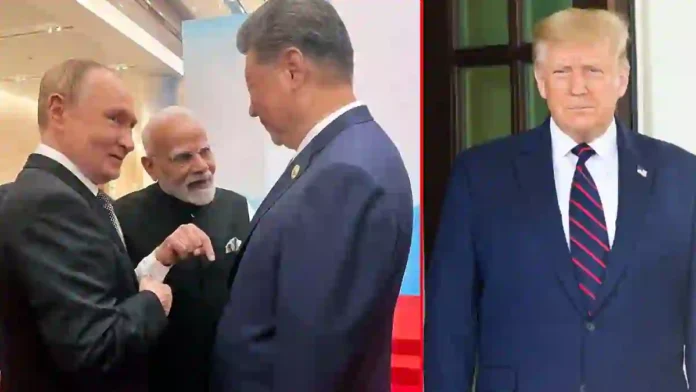Russian President Vladimir Putin’s strong statement following his four-day visit to China represents a carefully calibrated geopolitical signal, both to the United States and to the broader international community. By declaring that the “era of a unipolar world is over,” Putin underscored Russia’s long-standing position that global leadership should no longer be concentrated in Washington’s hands. The timing and context of his remarks make them particularly noteworthy.
His reference to India and China as “economic giants” was deliberately positioned to highlight the shifting balance of power towards Asia, where emerging economies are increasingly capable of shaping global trade, technology, and security architectures.
Read- Trump’s Personal Rapport With PM Modi ‘Gone Now’, Lesson For All: Ex-US NSA John Bolton
Putin’s remarks also had a veiled but pointed undertone towards former U.S. President Donald Trump’s tariff policies, which had generated economic confrontations during Trump’s tenure and reshaped the logic of global commerce.
By invoking India and China as counterweights to Western economic leverage, Putin showcased a multipolar framework where developing powers in the Global South, alongside established Eurasian actors, prevent Western states from setting unilateral terms in trade and politics.
This fits into Moscow’s broader vision of a multipolar world order that prioritises sovereignty, equality, and balance, contrasting with what Russia perceives as the West’s dominance through sanctions, market isolation, and institutional control.
Interestingly, Putin’s reference to his informal conversation with Indian Prime Minister Narendra Modi highlights Moscow’s nuanced diplomatic maneuvering. Russia recognises India’s central position in great-power competition: New Delhi is simultaneously a key partner in BRICS and the Shanghai Cooperation Organisation (SCO), a trusted defence partner of Russia, and increasingly a strategic actor in balancing ties between Washington and Beijing.
Putin’s mention of Modi reinforces Moscow’s intention not to be seen as solely aligning with China in its rivalry with the West but instead building a triangular orientation—Russia, India, and China—capable of influencing global decision-making beyond U.S. and European preferences.
Read- Russia To Complete Delivery of Remaining S-400 Systems To India By 2026
Read- Trump Plots Revenge, ‘Begs’ Europe To Sanction India Over Russian Oil After ‘Epic Tariff Fail’
With Beijing, Putin leveraged the optics of stronger Eurasian solidarity. The extended visit to China was more than symbolic—it reflected deepening strategic cooperation in energy, defence, and technology, as both countries face intensifying pressures from the transatlantic community.
Moscow and Beijing are cultivating integration corridors under frameworks like the Belt and Road Initiative (BRI) and Eurasian Economic Union (EAEU), projects that consolidate a continental vision distinct from maritime West-led economic systems. When Putin speaks of “equal multipolarity,” it is a direct endorsement of such continental frameworks, where no single power dominates but instead coalitions of states collectively shape the rules of engagement.
The implications of Putin’s statement are wide-ranging. For the West, particularly the U.S. and European Union, this is a stark reminder that sanctions and tariff-based economic coercion have limited reach in a world where actors like India, China, and even secondary powers in Asia, Africa, and Latin America are establishing alternative pathways for growth and security.
For Asia, the acknowledgment of India and China as giants signals Russia’s preference for cementing Eurasia as the frontline of multipolarity. For India, the message is complex: while New Delhi remains cautious about too close a Russia–China embrace, it benefits from Moscow’s recognition of its growing economic heft and from the space these shifting dynamics create for independent manoeuvring on global trade, energy diversification, and defence security.
Ultimately, Putin’s comments do more than critique Trump-era tariff nationalism—they reshape the narrative of where economic and political power resides in the 21st century. His recognition of India and China as anchors of a new global equilibrium affirms Moscow’s strategic bet that the United States will no longer enjoy undisputed dominance.
The statement also reflects Russia’s larger push to bind itself more deeply with Asian powers whose growth trajectories promise resilience and strategic autonomy. In doing so, Putin not only projects defiance against the West but also positions Russia as a central mediator in the rising multipolar landscape, amplifying its voice by aligning with the mega-economies of Asia.
Based On Mint Video Report
Agency




